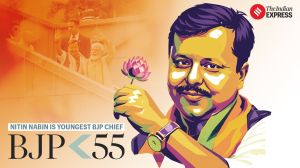Now What?
A Mahajan-sized hole is likely to haunt the BJP for a while. It figures, says Neerja Chowdhury after doing the math

FOR the longest time, Jan Sangh8212;and, later, BJP8212;workers were rewarded with two bread pakoras for each coupon they sold to collect chanda for the elections. All that changed once Pramod Mahajan took charge of fund-raising.
8216;8216;Don8217;t think in terms of small change,8217;8217; he would repeatedly tell party workers and colleagues, 8216;8216;think of big notes8212;their colour does not matter.8217;8217;
It goes without saying that the BJP will miss its Lakshman, its election strategist, its dynamic organiser, its in-house media manager, its coalition-builder. But most of all, it will miss the man who single-handedly changed the party attitude to money and its use in politics, to such an extent that 80 per cent of its funds is now supposed to come from corporates and industrialists. And that8217;s the vacuum the party will be the hardest pressed to fill, at least in the near future.
For the BJP, Mahajan8217;s demise could not have come at a worse time: The party is not in power, the rathyatras have flopped. Moreover, the party is yet to consolidate itself under its new president, whom Mahajan8212;denied the post himself8212;was backing in the belief that if the enemy cannot be eliminated, he must be outlived.
Capital Gains
ACCORDING to his brother Pravin, who allegedly pumped three bullets into Mahajan on April 29, the BJP general secretary was worth Rs 2,000 crore. Others say the figure is higher. Possibly, only Mahajan was aware of his own true worth.
8216;8216;Besides the cash funds, there could also have been IOUs which only he could have called in at election time,8217;8217; say party insiders.
It is Mahajan8217;s skills as a fund-raiser and fund-manager that allowed him to organise mega-events of the kind mounted in Mumbai for the BJP8217;s Rajat Jayanti in December 2005, or focus campaigns for the 2003 state elections in Rajasthan, Madhya Pradesh and Chhattisgarh on the issues agitating potential support groups in various assembly segments. No one to quite fits those shoes today.
In competitive politics of the kind commonplace in post-liberalisation India, every party looks for a Pramod Mahajan, who can unabashedly use saam daam dwand bhed as a political weapon. While others in the party ran shy of soiling their hands with funds-raising8212;even as they happily used those funds8212;Mahajan never recoiled from the task. Once he told friends, 8216;8216;At election time I8217;m asked to mobilise resources and I go to certain industrialists. They ask me, 8216;Do you want to be a wife or a mistress? We are interested only if you want to be a wife8217;.8217;8217;
The flip side to such candour was the Sangh leadership8217;s severe criticism of his 8216;five star8217; ways. When colleagues took him to task, he8217;d retort, 8216;8216;It8217;s all very well to talk. But party hawa mein to chal nahin rahi hai. You are no longer moving around on a bicycle, but in a Honda City.8217;8217;
Call Waiting
MAHAJAN understood, better than anyone, how the system worked and which buttons to press. The politics of 8216;8216;give and take8217;8217; made him effective with allies and even as parliamentary affairs minister, when he was often heard addressing Congress leaders during an impasse in Parliament: 8216;8216;Asli baat par aao, kya chahiya hai8217;8217;.
Over the years, he managed to create an effective parallel political structure of supporters personally loyal to him. They were invaluable to him whether he was organising L K Advani8217;s Ram Rath Yatra in 1990 or running the control room during the 2003 elections in Jaipur8212;and they also made him invaluable to both Vajpayee and Advani. Mahajan had the gift of inspiring fierce loyalty and he, in turn, looked after his supporters.
There are Gen Next leaders in the BJP today who, like Mahajan, are sharp, intelligent and blessed with considerable organisational abilities. But they may not be ready to cock a snook at many of the things that Mahajan dispensed with as hypocrisy.
They know that while money is essential for doing politics today and the power structure compels compromises, image is singularly important in mass politics. That is why Mahajan, with his controversial image, had trouble being accepted by the Sangh8212;and also the reason why he, so effective as a number two, might have had trouble reaching the pinnacle. For all the clout he wielded in Maharashtra and for all the elections he so successfully organised for the BJP, he himself won only one Lok Sabha election.
Similarly, there are leaders in the party who are not squeamish about money or its mobilisation. But not many can match Mahajan in his other talents. Somebody epitomising the combination will emerge but it may take time.
As for the RSS, even as they pay their homage to Mahajan, who started off his career with them, Sangh leaders are also talking about freeing the BJP of the 8216;8216;money module8217;8217; he had put into place so that the party can become an 8216;8216;ideology-based8217;8217; outfit again.
While the party has proved, time and again, to be stronger than the individual, for the moment, it has to cope with a hole the size of Mahajan.
- 01
- 02
- 03
- 04
- 05































